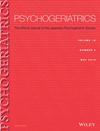Behavioural and psychological symptoms of early‐onset and late‐onset Alzheimer's disease among Chinese adults
IF 1.7
4区 医学
Q3 GERIATRICS & GERONTOLOGY
引用次数: 0
Abstract
Dear Editor, We read with interest the report by Fang et al. on the comparison of behavioural and psychological symptoms of dementia (BPSD) in Chinese patients with early-onset Alzheimer’s disease (EOAD) and late-onset Alzheimer’s disease (LOAD) and the analysis of the modifiable factors. The authors reported significant differences in BPSD between the EOAD and LOAD groups at baseline. We would like to discuss their result in detail below. Fang et al. reported that worse caregiver attitudes were associated with more severe overall psychobehavioural symptoms in the EOAD group. Additionally, the authors showed that an improvement in BPSD was associated with positive attitudes and fewer expressions of criticism. We agree that positive aspects of caregiving are important. However, previous longitudinal studies have reported that BPSD impacts caregiver burden. We believe that both positive and negative aspects of caregiving are important. We wonder if caregiver burden of negative aspects among caregivers may be considered a confounding factor. Therefore, we are interested in an analysis of the negative aspects with regard to caregivers in this study. Undoubtedly, it is important to focus on BPSD in patients with EOAD and LOAD. Fang et al. provide useful data on the same. We believe that focusing on BPSD may support caregiving at home for Chinese patients with EOAD and LOAD in the future.中国成年人早发和晚发阿尔茨海默病的行为和心理症状
尊敬的编辑,我们饶有兴趣地阅读了方等人关于中国早发性阿尔茨海默病(EOAD)和晚发性阿尔茨海默症(LOAD)患者痴呆行为和心理症状的比较以及可改变因素的分析的报告。作者报告了EOAD组和LOAD组在基线时BPSD的显著差异。我们想在下面详细讨论他们的结果。方等人报道,在EOAD组中,较差的照顾者态度与更严重的整体心理行为症状相关。此外,作者还表明,BPSD的改善与积极的态度和更少的批评表达有关。我们同意护理的积极方面很重要。然而,先前的纵向研究报告称,BPSD会影响护理人员的负担。我们认为,照顾的积极和消极方面都很重要。我们想知道照顾者中消极方面的照顾者负担是否可以被认为是一个混淆因素。因此,我们有兴趣在本研究中对照顾者的负面方面进行分析。毫无疑问,关注EOAD和LOAD患者的BPSD是很重要的。方等人对此提供了有用的数据。我们相信,关注BPSD可能会支持未来中国EOAD和LOAD患者的家庭护理。
本文章由计算机程序翻译,如有差异,请以英文原文为准。
求助全文
约1分钟内获得全文
求助全文
来源期刊

Psychogeriatrics
Medicine-Geriatrics and Gerontology
CiteScore
3.60
自引率
5.00%
发文量
115
审稿时长
>12 weeks
期刊介绍:
Psychogeriatrics is an international journal sponsored by the Japanese Psychogeriatric Society and publishes peer-reviewed original papers dealing with all aspects of psychogeriatrics and related fields
The Journal encourages articles with gerontopsychiatric, neurobiological, genetic, diagnostic, social-psychiatric, health-political, psychological or psychotherapeutic content. Themes can be illuminated through basic science, clinical (human and animal) studies, case studies, epidemiological or humanistic research
 求助内容:
求助内容: 应助结果提醒方式:
应助结果提醒方式:


